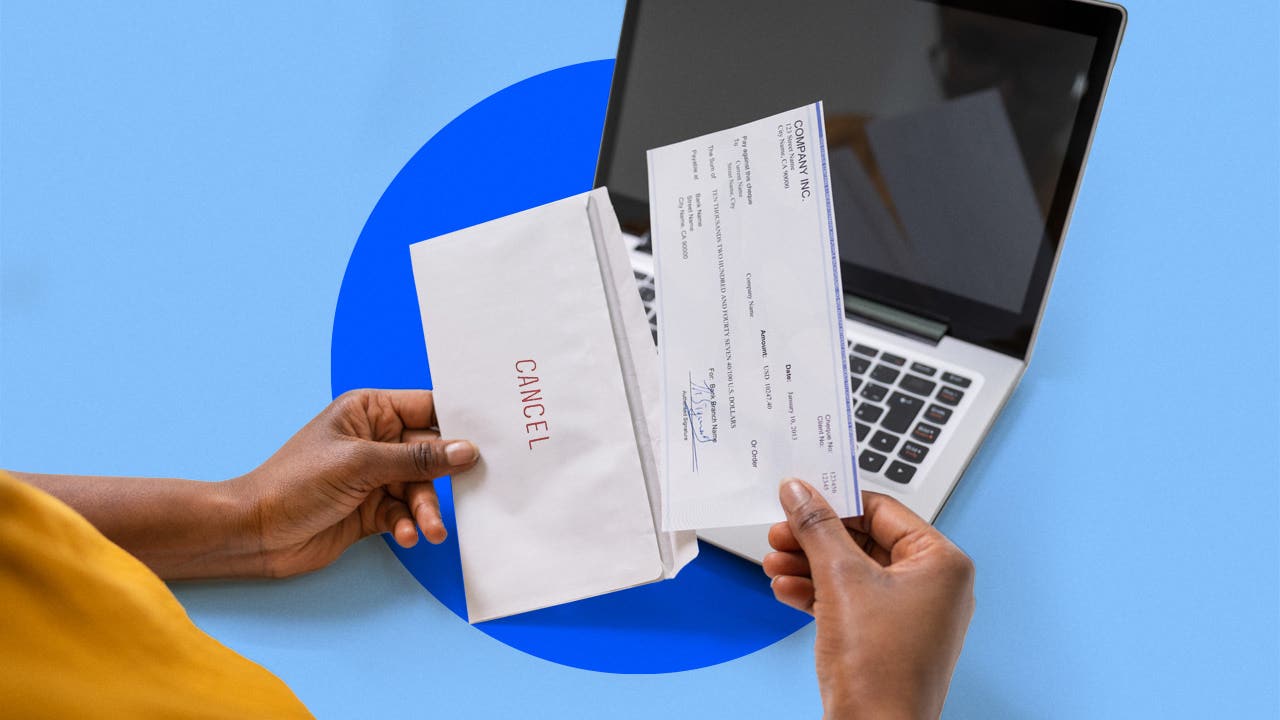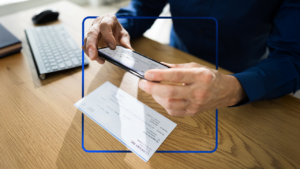How to cancel a check: 4 important steps

Key takeaways
- A cancelled check or stop payment request prevents funds from leaving your account when someone tries to cash or deposit the check.
- You must act quickly — banks cannot stop payment on checks that have already been processed or cleared.
- Stop payment fees typically range from $25 to $35, though some premium accounts waive these charges.
- Oral stop payment requests last only 14 days, while written requests are honored for six months.
You can cancel a check by requesting a stop payment from your bank to prevent funds from being withdrawn from your checking account. Whether you wrote a check for the wrong amount, lost your checkbook or need to dispute a transaction, you need to act quickly to stop the payment before it clears.
Once a check enters the clearing process, your bank cannot reverse the transaction. Here’s how to successfully cancel a check and protect your finances.
1. Verify the check hasn’t been processed yet
Check your account activity immediately to confirm the payment hasn’t cleared. Review your recent transactions through online banking, your bank’s mobile app, or by calling customer service.
If you don’t see the check amount listed as a completed transaction, you still have time to act. However, checks can clear within 24 hours of deposit, especially with mobile check deposits becoming increasingly common.
Keep in mind: Check your account status before calling the bank. Some checks clear faster than others, and knowing the current status helps you communicate better with bank representatives.
Some banks allow you to temporarily freeze your account through their mobile app while you prepare to request a stop payment. This prevents any checks from clearing, but remember it will also block legitimate transactions. If your current bank doesn’t offer robust mobile features, compare Bankrate’s top mobile banking apps to find better options.
2. Gather your information
Before contacting your bank, collect these essential details:
- Your checking account number
- The specific check number you want to cancel
- The exact payment amount
- The payee’s name (who the check was written to)
- The reason for cancellation
The bank might request information on why you are canceling the check. Was it made out for the wrong amount or to the wrong payee? Are you disputing the transaction? Or was the check stolen?
3. Contact your bank and pay the fee
Most banks offer three ways to request a stop payment:
Online banking (often cheapest): Look for “stop payment” or “cancel check” options in your account dashboard. This method typically costs less and creates an automatic written record. If your bank’s online platform is difficult to navigate, consider switching to one of Bankrate’s best online banks for a better experience.
Phone: Call the customer service number on your debit card. Have your account information ready and be prepared to verify your identity.
In person: Visit a branch location if you prefer face-to-face service or need additional assistance.
| Bank | Stop payment fee | Fee waived for |
|---|---|---|
| Bank of America | $30 | Bank of America Advantage Relationship Banking, Bank of America Advantage with Tiered Interest Checking and Bank of America Advantage Regular Checking accounts plus Preferred Rewards customers |
| Chase Bank | $30 ($25 online) | Select premium account holders |
| Citibank | $30 | Customers with Citi Priority and Citigold account packages |
| TD Bank | $30 | Beyond Checking, Beyond Savings, Signature Savings, Private Tiered Checking and Private Tiered Savings account holders |
| PNC Bank | $33 | Performance Select customers |
| Fifth Third Bank | $33 | Preferred Banking customers |
4. Understand the duration of your request
Stop payment requests aren’t permanent. The duration depends on how you submitted your request:
- Oral requests: Valid for only 14 calendar days. This applies to phone requests where you don’t follow up in writing.
- Written requests: Honored for six months from the date of request. Online submissions typically count as written requests.
Monitor your account regularly during this period to ensure the stop payment remains active and the check doesn’t accidentally clear.
Money tip: Even after requesting a stop payment, continue monitoring your account. Bank processing errors can occur, and you want to catch any issues immediately.
When should you cancel a check?
- Lost or stolen checks: If your checkbook goes missing or a single check is lost, request a stop payment to prevent unauthorized use. For entire checkbooks, consider closing your account entirely and opening a new one with enhanced security features.
- Payment errors: You wrote the wrong amount, made the check out to the wrong person, or need to correct other mistakes on the check.
- Disputed transactions: You’re unsatisfied with goods or services and want to prevent payment while resolving the issue with the merchant.
- Fraud prevention: You suspect someone is attempting to use your checks fraudulently or you’ve been targeted by a check scam.
- Changed circumstances: The original reason for payment no longer applies, such as a cancelled service or returned merchandise.
What happens after you request a stop payment
Once your bank processes the stop payment request, they’ll monitor for the specific check. If someone attempts to deposit or cash the check, the bank will reject the transaction and return the check to the depositing institution.
The person holding the check will typically receive notification that payment was stopped. They may contact you to resolve the issue or request a replacement payment method.
Keep records of your stop payment request, including confirmation numbers and dates. This documentation proves you took appropriate action if questions arise later.
Next step: Find the right checking account for your needs
Ready to upgrade your banking experience? Compare checking accounts that offer:
- Advanced mobile banking features
- Low or no monthly fees
- Comprehensive fraud protection
- Easy stop payment processes
Compare Bankrate’s best checking accounts →
Why we ask for feedback Your feedback helps us improve our content and services. It takes less than a minute to complete.
Your responses are anonymous and will only be used for improving our website.







